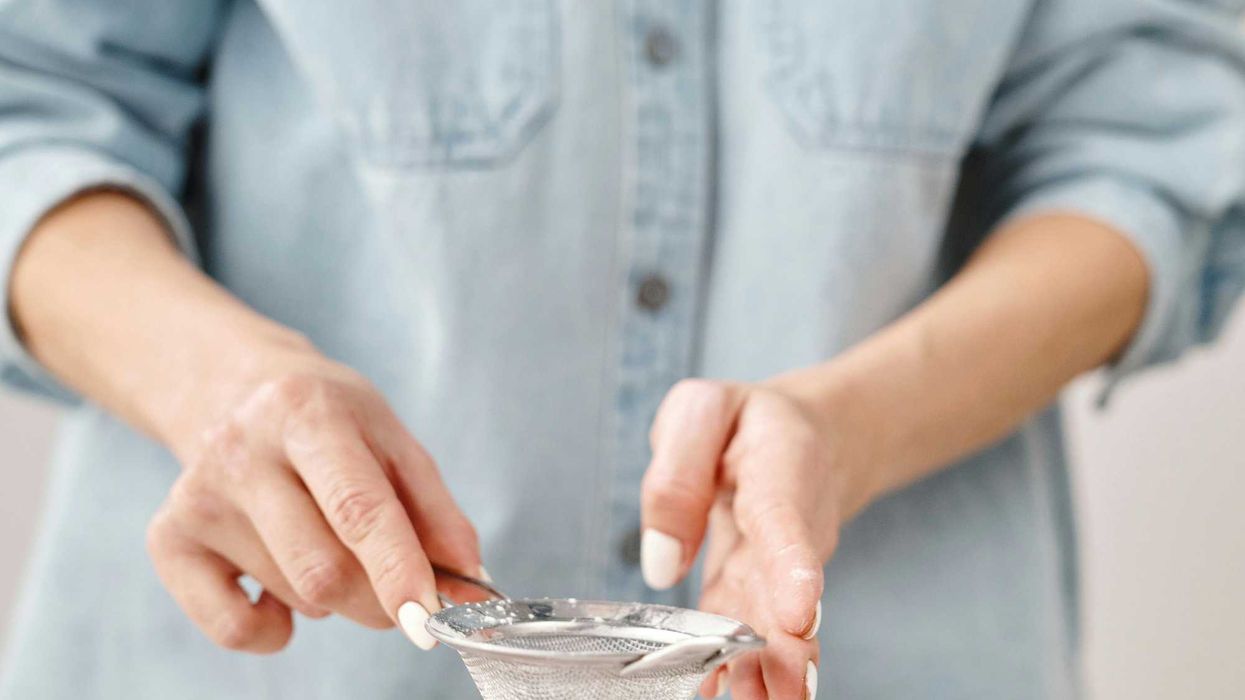Some of these “healthier” items are worth leaving off your grocery list.
8 Foods You Should Avoid At The Grocery Store, According To A Nutritionist

Meredith Holser is the Shopping Editor at Brit + Co, covering everything from seasonal fashion trends and the best grocery finds from Trader Joe's to shoes actually worth splurging on and life-changing beauty products. Outside of work, you can catch Meredith hiking, trying new recipes, and dreaming about having a yummy little treat.
Grocery shopping can be a total nightmare if you’re trying to eat healthier. Between the endless food options, nutrition labels, and the occasional sweet treat tempting you at the end caps, sifting through the noise and figuring out what items are actually good for you is downright flustering and frustrating.
Is whole grain pasta really better than regular noodles? Does an “organic” label mean anything these days? Should I be swapping soda for diet drinks? I tapped nutritionist and chef Mareya Ibrahim (AKA The Fit Foodie) to get to the bottom of the most common questions sparked at the store. Plus, she offers some solid advice and healthier swaps for frequently-bought items!
Antoni Shkraba / PEXELS
First things first, it’s important to acknowledge that health and nutrition is extremely personal, and what’s ideal for you might not be ideal for someone else. According to Ibrahim, gender, activity level, pre-existing health conditions, DNA, and cultural background all play a role in determining what foods agree with your lifestyle.
“Someone following a low-carb diet may label staples like bread or pasta as unhealthy, while a gym-goer who lifts heavy weights might require a lot of carbs to help grow muscle,” she says. “Some may not have the ability to break down heavy meats and saturated dairy and fat while others have no problem with it – it’s very individual.”
Ultimately, she still recommends “fresh, whole foods” over items with excessive sugars, oils, and saturated fats. This is where label-reading can come in super handy to help you make the ideal choice for your diet.
“Just because a snack says “organic” doesn’t mean it’s nutritious,” she says. “A lot of these snacks can still be high in calories and low in nutrients. Low-fat or fat-free products often pack in extra sugars to make up for lost flavor, making them not much healthier than the full-fat versions.”
Still curious about the best healthy swaps you can make at the grocery store? Read on for Ibrahim’s top tips.

Any Lane / PEXELS
1. Swap yogurt tubes for Greek yogurt.
A lot of seemingly-healthy yogurts can actually be packed with lots of sugar. Instead, Ibrahim recommends grabbing Greek yogurt with under 12 grams of sugar. Greek yogurt also often has more protein per serving, so it can help keep you fuller for longer and build muscle while you’re at it.
“When it comes to reduced sugar items, cutting back is smart, but be cautious of artificial sweeteners and additives that might not be any better for you,” she offers.

RDNE Stock Project / PEXELS
2. Avoid snack packs with processed meats and cheeses.
Though they’re quite convenient, ready-to-go snack packs filled with meats and cheeses are often loaded with sodium, saturated fat, nitrates, and nitrites, according to Ibrahim.
“Some of these snacks contain around 600 milligrams of processed sodium, which is about 30% of your daily limit,” she says.
They also often don’t supply a lot of fiber, which is crucial in keeping you full and boosting your digestive system.

Bruno Scramgnon / PEXELS
3. Be wary of “100% fruit juice.”
Though labeled as 100% fruit juice, labels can still be misleading when it comes to drinks, says Ibrahim.
“It’s often full of concentrated sugars and calories without the nutritional punch of whole fruit,” she says. “Stick to fresh, whole fruit instead – they’re brimming with fiber, vitamins, minerals, and antioxidants.”

Polina Tankilevitch / PEXELS
4. Skip the sodas.
Soda can be a nice afternoon treat, but can be “sneaky” since it’s often filled with miscellaneous chemicals and artificial sweeteners, says Ibrahim. Of course, a sip here and there won’t be a huge detriment to your health, so enjoy in moderation.
Anshuman Mohapatra / PEXELS
5. Think twice about candy, cookies, and cakes.
It’s no secret that a lot of store-bought sweet treats are loaded with sugar. Skip the processed stuff and try making your own low-sugar desserts when your sweet tooth hits!
Anna Shvets / PEXELS
6. Swap sugary sports drinks for natural sips.
Ibrahim recommends opting for unsweetened coconut water or zero-sugar electrolyte drinks to fuel your pre- and post-workout rituals instead of popular sports drinks, which often have loads of sugar that can slow you down.
“Unless you’re hitting the gym hard, they’re usually just sugary water,” she says. “Stick with plain water or add a zero-sugar electrolyte for hydration.”

Bruno Scramgnon / PEXELS
7. Keep an eye on your go-to granola.
Granola is another one of those sneaky health foods that can be high in sugar, says Ibrahim. When it’s packed with honey or sweeteners, it can really up the calorie count. Opt for ready-made granolas with low sugar contents or try making your own easy recipe at home!

Antoni Shkraba / PEXELS
8. Avoid processed nut butters.
Processed nut butters can come with a lot of unwanted fats, sugars, and oils that take away from the protein and minerals they’re packed with. Instead, track down the natural nut butter varieties that just contain nuts in the ingredients to skip out on the extra stuff.
Subscribe to our newsletter for more nutrition tips!
Lead photo by Tara Clark / PEXELS.



















